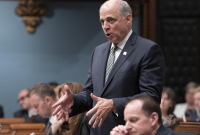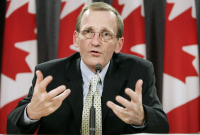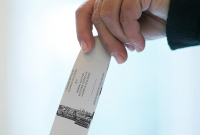Support strong Canadian climate journalism for 2025
A new poll conducted for The Canadian Press seems to show the cloud of the SNC-Lavalin controversy is lifting for the federal Liberals, who now face a closer fight with the Conservatives less than three months to go until the election.
In a survey conducted earlier this month, the polling firm Leger found 36-per-cent support among decided voters for the Conservatives, versus 33 per cent for the Liberals.
The firm says support for the Tories has dipped by two percentage points since the last time it conducted a survey in June, while support for the Liberals has gone up by four percentage points.
At 12-per-cent support among Leger's respondents, the Greens were slightly ahead of the New Democrats' 11 per cent. The Bloc Quebecois was favoured by four per cent and Maxime Bernier's People's Party of Canada was at three per cent.
The latest poll was conducted among 1,536 Canadians who are eligible to vote and were recruited from an online panel maintained for the purpose.
In its report, Leger said it cannot provide a margin of error for an internet panel because the method doesn't provide a truly random sample. But for comparative purposes, a "probability sample" would have a margin of error of plus or minus 2.5 per cent, 19 times out of 20.
Leger vice-president Christian Bourque said in an interview that the Liberals are just about back to levels of support that they had prior to the SNC-Lavalin controversy, which saw former justice minister Jody Wilson-Raybould resign from Prime Minister Justin Trudeau's cabinet.
In late February, Wilson-Raybould testified before the House of Commons justice committee that there was a "consistent and sustained effort" over the span of approximately four months by many people within the government to interfere in her exercise of prosecutorial discretion in her role as attorney general. They wanted her to arrange a type of plea-bargain for SNC-Lavalin, a giant Quebec-based engineering firm, on charges of corruption related to dealings in Libya.
Wilson-Raybould's cabinet colleague Jane Philpott also resigned over Trudeau's handling of the issue and both went on to be expelled from the Liberal caucus.
The sustained controversy was linked to a deteriorating support for the Liberals during the winter that saw Prime Minister Justin Trudeau slide for the first time in this mandate from being the top choice for Canadians in the upcoming election, Bourque said.
"We saw a (national) jump from 36 up to 40 per cent for the Conservatives in late April in sort of the peak of that crisis and the Liberals actually going from the mid-30s down to the mid-20s at that time," he said.
It was more than a knee-jerk public reaction to a string of bad news because the downward trend for the Liberals lasted for months, he added.
"After six months of the grey cloud ... there's sunlight (for the Liberals) again," he said. Bourque noted that relatively small changes in national support are driven by more substantial shifts in Quebec and Ontario.
In Quebec, Bourque said the Conservatives were out slightly ahead in Leger's April polling but the Liberals have returned to a lead that is, if not exactly comfortable, substantial enough that they can shift their thinking back to how many seats they can try to pick up in the province.
As for who respondents viewed as the best prime minister, Scheer led by a hair at 24 per cent while Trudeau sat at 23 per cent. The Greens' Elizabeth May was at nine per cent, the New Democrats' Singh was at seven per cent and People's Party of Canada Leader Maxime Bernier was favoured by four per cent.
A regional breakdown of the numbers shows the Conservatives did very well in Manitoba, Saskatchewan and Alberta but led by just a point in Atlantic Canada and British Columbia. The Tories and Liberals were tied Ontario and the Liberals led comfortably in Quebec.
Survey participants were also asked whether they felt the Liberals deserve a second mandate and whether the Conservatives have shown they deserve to form government. They were not very enthusiastic about either prospect.
Respondents said that 51 per cent did not think the Liberals deserve another whack at power. Thirty per cent said they do and 18 per cent were undecided.
As for the Conservatives, 32 per cent of respondents said they did believe the Tories have demonstrated they should form the next government while 44 per cent said they haven't and 24 per cent were undecided..
Bourque said one of the most troubling things for the New Democrats is that they are not seeing a regional concentration of support — a bastion where the party can hope to remain strong and retain seats it currently has.
The party is polling fourth in British Columbia behind the Greens, a distant fourth in Alberta, a distant third in Manitoba and Saskatchewan. It's tied for fourth place with the Greens in Ontario and sits fifth in Quebec, he said.
Since the start of 2019, Singh and May have been close in terms of support, Bourque said, adding the issue now for Singh is how much head space there is for him and his party with an increased focus on the Greens.
"It seems more and more he's sort of being pushed out in terms of grabbing Canadians' attention," he said.





Comments
Not a truly random sample it states. I am guessing it is top heavy with Upper and Lower Canada which means it is not accurate across the country. Just a guess but ...........